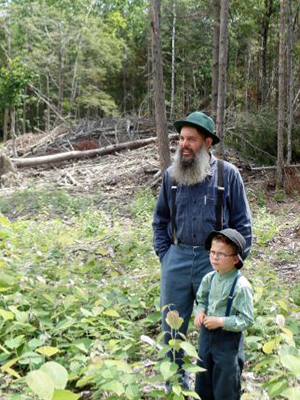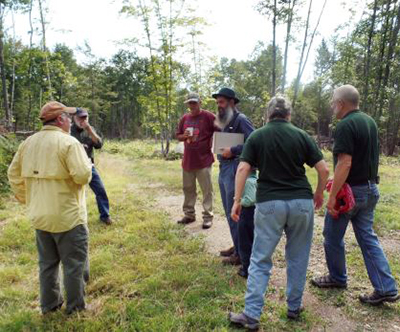 Being a consulting forester is not an easy job. There is a lot of time spent outdoors in all kinds of weather. Dealing with insects in the woods can also be a problem, from biting gnats to treekilling insects, such as the emerald ash borer and hemlock woolly adelgid.
Being a consulting forester is not an easy job. There is a lot of time spent outdoors in all kinds of weather. Dealing with insects in the woods can also be a problem, from biting gnats to treekilling insects, such as the emerald ash borer and hemlock woolly adelgid.
Field work can be dangerous at times as well because falling trees are inherently perilous. And there’s a fair amount of paperwork. Direct, face-to-face contact with customers is also essential to the job. Adding to the complexity is the business end of things. In addition to serving as an expert in the forestry field, a consulting forester has to be part entrepreneur and part business manager.
Foresters, like other professionals, also need to keep up with the latest thinking in their chosen field to stay relevant. Yet despite these complexities and others, Corinna, ME-based consulting forester Robert Nelson has no shortage of work or customers. He said he finds his work really rewarding.
Interestingly, Nelson is a Mennonite. He said they’re like the Amish in some ways, except that they drive cars and use electricity. According to Wikipedia, Mennonites are an Anabaptist religious denomination, similar to the Amish. There are about 2.1 million Anabaptists alive today worldwide.
“The Mennonites’ doctrine is almost identical to Amish people, although Mennonites have differences in lifestyle issues,” he said. “Amish people reject automobiles and electricity. Mennonites use those, but we don’t have TVs, computers, radios, or much in the way of tech items,” he added.
His religion requires him to do certain things a little differently from some other people, and that is apparently okay for both Nelson and his many customers. For instance, he types his reports on a typewriter instead of a computer, and he does not spend time on a smartphone or surfing the Internet.
Challenges and Benefits
He said that being a Mennonite in his line of work does have its challenges as well as its benefits. “Being a Mennonite causes challenges interacting with people electronically. We don’t have email, computers, or the Internet, so that makes things more challenging. I get by without those things and on the strength of personal relationships,” he added.
He noted one benefit of being a Mennonite in his line of work: “Generally, Mennonites have a reputation for hard work and honesty, and we try to uphold that.”
Nelson has been a forester longer than he’s been a Maine resident or a Mennonite. He spoke of his move northward to Maine and becoming a Mennonite. “I quit my job as a forester with a company named Mead Westvaco, and we moved to Maine to join up with the Mennonite community in central Maine. It was a gradual community building. Our moving to Maine in 2011 and becoming Mennonite happened at around the same time.”
 His specialty today is low-impact forestry. “As the name suggests, there is less soil disturbance, and less root and bole damage to trees, and usually better aesthetics as well,” he added. He described the scope of his work. “Broadly, about 35 percent of my time is developing forest management plans for landowners. About 65 percent of my time is helping landowners take those same plans and put them into concrete action. That 65 percent involves a broad range of activities, including commercial timber harvesting, precommercial tending and intermediate stand management, invasive plant control, and developing access roads and trails, along with tree planting.”
His specialty today is low-impact forestry. “As the name suggests, there is less soil disturbance, and less root and bole damage to trees, and usually better aesthetics as well,” he added. He described the scope of his work. “Broadly, about 35 percent of my time is developing forest management plans for landowners. About 65 percent of my time is helping landowners take those same plans and put them into concrete action. That 65 percent involves a broad range of activities, including commercial timber harvesting, precommercial tending and intermediate stand management, invasive plant control, and developing access roads and trails, along with tree planting.”
Over a number of years of working with logging contractors, Nelson said he became increasingly dissatisfied with the size of forestry equipment used and its impact on the land, adding, “As the years went by, the equipment has gotten bigger and bigger.”
Nelson said his concerns were twofold: 1) the equipment’s impact on the land, and 2) the size of the equipment, which was driving the type of forestry practiced, as opposed to the forestry practice driving the type of equipment used. Those concerns were echoed by a number of Nelson’s clients. They expressed the desire to have a harvest done with smaller harvesting equipment, he added. After about a year of thinking about that and investigating different options, Nelson ended up buying a small, low-impact forwarder from Sweden, a Vimek 608. The machine rides on six low-impact tires to reduce harmful environmental impacts from logging. That type of equipment does a very nice job, he said.
However, because of its lower productivity, it costs more to use. As such, landowners have to be willing to accept those higher costs. Higher costs mean lower net income for them. Nelson said he still believes standard harvesting equipment has its place, and he regularly uses contractors with that type of equipment when it is appropriate. This is especially true for final harvest situations in which the harvest equipment size is less of a concern. The machine Nelson uses is only 6½ feet wide; standard harvesting equipment is typically about 10 to 12 feet wide, he added.
“Almost all of my customers are private landowners,” he said. “For smaller properties, after the initial work, it might be 10 years or so before the next cycle. Conversely, there are a number of landowners with such large properties that you end up doing stuff all the time,” he said. Nearly all of his customers manage their land for a variety of purposes. “Maintaining forest health is the most common reason; wildlife would probably be second,” he added.
Benefits of Managing Forests
“There are many reasons for wanting to manage forest land,” he added. “Good forest management almost always improves wildlife habitat. You can manage your land to improve your timber. Forest health is also another big concern, because it increases resilience to disease and climate change stressors.”
He said the positive outcomes of good forest management speak for themselves—“better forest health as well as more diverse wildlife habitat, [a] more resilient forest, and in most cases, some economic return from management activity.”
Despite the inherent challenges of his field, he finds his work really satisfying, he said, and he is pleased to be able to make a living for his family. “It’s gratifying to be able to help landowners achieve their goals,” he said. “Also, it’s pleasing to be able to do harvesting work in a way that doesn’t degrade the land.” “I really enjoy the diversity of my work. Each landowner’s priorities are different. Their properties are different. The economic conditions are different. You never run out of interesting scenarios to apply yourself,” he added.
Nelson said his love for the outdoors and his line of work came about as a natural result of his spending lots of time outdoors exploring the natural world as a child. “I liked to just roam around the woods all day long,” he added. “I grew up in western Pennsylvania, on the outskirts of the greater Pittsburgh metropolitan area. Where we lived, there were a number of cliffs and caves and rock formations. When you’re a boy, you never get tired of looking in the creek and seeing what happens to live there.”
He said his education and experience, along with taking advantage of continuing learning opportunities, have helped prepare him to be successful in his line of work and to keep his skills sharp.
“I have a B.S. degree in forestry from Virginia Tech in 1991. I’ve been a consulting forester for five years. I have an M.B.A., a master’s of business administration. It helps when you have your own business. It also helps in a very broad sense to have a better understanding of how the business world works and economic principles.”
“Quite often, I take advantage of continuing education courses in forestry and wildlife as much as possible,” he said.
When not working or at home, Nelson said he likes to read and hunt. Nelson and his wife, Judie, have five children. Interestingly, though he spends a lot of time in the deep woods, he and his family have a relatively modest four acres of land on which they live. He said one of their home’s most interesting features is the row of thick-trunked maples that line the roadway. He said they also added some gardens in recent years. “I am thankful to own my own land,” he added
 Sign In
Sign In
 Sign In
Sign In
